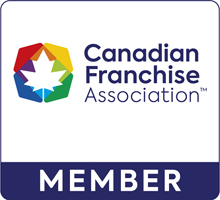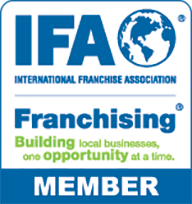FAQs About FranNet Franchise Opportunities
- What is franchising?
- What benefits do I enjoy if I own a franchise, and what are my responsibilities?
- What are the criteria for choosing a franchise?
- Are there lawyers who specialize in franchising?
- What is the disclosure document?
- Have I got what it takes to be a successful franchisee?
- What should I prepare when I go a to franchise exhibit or fair?
- Where can I get more information?
1. What is franchising?
There are two or more parties to a franchise: the owner of the trademark, brand or advertising logo, and the person(s) interested in using the owner’s trademark, brand or logo. A franchise is therefore a legally binding, business relationship between the owner and the individual(s) who “borrows” or “rents” the owner’s franchise name.
The owner is the franchisor, the individual borrowing the name is the franchisee. When franchisor and franchisee decide to do business together, a franchise agreement is drawn up. This agreement governs all aspects of operations and sets out the rights and duties of both parties. In some franchises, the franchisor can provide any or all of these services:
- Site selection
- Training
- Product supply
- Marketing plans
- Advertising
- Financing
The franchisee sells the goods or services provided by franchisor.
2. What benefits do I enjoy if I own a franchise, and what are my responsibilities?
Potential franchisees looking to purchase a franchise are attracted by factors such as:
- Access to a respected brand/product
- Tried and tested operating methods
- Minimised risks
A FranNet survey revealed that among those who consulted with us, 91.2% were still business after two years, while 85% were still in business after five years.
Ted Van Samang says that in Canada, a franchise opens every two hours, 365 days a year and that franchising is the preferred Canadian small business expansion model.
If you are serious about buying a franchise, be prepared to put in hours and hours of time and energy, not to mention financial resources. This shouldn’t discourage you because you’ll get all the help you need from your Canadian FranNet consultant.
If support is a determining factor in making your decision, bear in mind that some franchisors offer assistance in all aspects of the franchise operation; other franchisors, however, will offer some support. And still, some franchisors provide ongoing support such as issuing newsletters and making available a toll free number for technical assistance. Workshops and seminars are also offered by some franchisors.
3. What are the criteria for choosing a franchise?
Questions you should be asking are:
- How much demand is there for this product or service?
- Who will be my competitors; what’s their market share?
- How long has the franchisor been in this business?
- What is his background?
- How much support will I receive?
Demand
There are products and services that are in high demand but only during certain seasons. Examples are lawn care, spring cleaning, and biking accessories. So ask yourself if you’re interested in a franchise selling products and services that are in demand only at certain times of the year.
Competition and market share
How many franchises like yours are in your community? In the city, in the province? How much do they charge for their products and services? What is the level of competition, nationally and locally? How many outlets does the franchisor have in your area? Do your competitors sell similar products or services; if so, at what price?
Important: generally, well-run franchises have high success rates. But do bear in mind that some of them fail. So other questions worth asking are:
- Will I be able to continue operating even if the franchisor goes out of business?
- Will I need the franchisor’s continuing support to succeed?
- Will I have access to the same or other suppliers?
- Can I run the business alone if I had to reduce staff size?
Franchisor’s background, reputation and years of experience
A primary consideration for purchasing a franchise is the license to use the franchisor’s name and brand. The more popular the name, the higher the number of customers it attracts.
Part of a successful franchise is the franchisor’s experience, and how many years the franchise has been operating. How does the franchisor score on credibility and integrity? Does the Better Business Bureau have any complaints filed against the business?
Remember: there is no guarantee that a successful entrepreneur can successfully manage a franchise system.
What do friends and family say about the company’s products or services?
How much support is available
Potential franchisees who never had a business before worry just as much about the post-purchase phase as the pre-purchase phase. What level of support and training does the franchisor provide? Is the franchisor qualified to provide such training and support?
Growth
A growing franchise system enhances the franchisor’s reputation, enabling you to attract a larger customer base. But growth alone does not mean success. A company that grows too quickly may not be able to support its franchisees as originally promised. Make sure the franchisor is financially healthy.
4. Are there lawyers who specialize in franchising?
Individuals who are thinking of buying a franchise can first check with their provincial Bar association. Many of these associations have publications featuring lawyers and their areas of practice.
For example, on the website of the Ontario Bar Association (www.oba.org), a “Find a Lawyer” is displayed prominently on the right side. Clicking on it, you are taken to a form that asks you to fill your name and location. One of the drop down menus is Area of Law. If you click on the down arrow, there is a long list of practice areas. Franchising is one of them.
In British Columbia, the Bar Association web site (www.cbabc.org) allows the public to email for a lawyer referral. Go to the “contact us” tab and you will see Lawyer Referral under Primary Contacts.
5. What is the disclosure document?
The Canadian Franchise Association (CFA) states that the disclosure document is the minimum disclosure required of CFA members. Information must include:
- Name and address of franchisor
- Franchisor’s number of years’ experience
- Names of directors, partners and officers
- Nature of the business
- Contact details for existing franchisees
- Required investment by the franchisee
- Plus other information
You can download a PDF version of a sample disclosure document with commentary here: http://www.cfa.ca/tools_resources/disclosure-document-guide/
Your lawyer should guide you through the provincial regulations. Relevant information is also available at http://www.cfa.ca/advocacy/franchise-legislation/.
6. Have I got what it takes to be a successful franchisee?
Start by assessing your own skills, abilities and experience. Ideally, desired personality traits are creativity, openess, and motivation to succeed. Too much independence, however, can show tendencies to resent guidance and hesitation to comply with rules.
For franchisee and franchisor to work well, a mutual understanding of each other’s values and achievements, as well as obligations, is of paramount importance.
Decide what your specific goals are and how you intend to accomplish them in five, 10 and 15 years.
What skills and assests will help you succeed, and how do you rate your ability to learn new concepts?
Speak to your family. Are they prepared not to have you around the dinner table at all times?
7. What should I prepare when I go a to franchise exhibit or fair?
A franchise exhibit or fair introduces you to an exciting array of franchise possibilities. Be careful of salespersons hard selling franchises you’re not interested in. So before your visit, do your research. Your research must cover:
- The amount of money you can afford to invest
- What type of business is right for you (just because it sells like hotcakes doesn’t mean it’s your ideal franchise opportunity. To be really successful, you have to enjoy what you sell and derive as much emotional satisfaction as possible)
- Interest in the industry
- Your background and skills
- Royalty payments
- Growth in the number of franchisees (if there’s no growth in the number of franchisees, consider that a red flag)
- Franchisor’s experience and years in the business
- Level of support and training
Take copious notes. Talk to as many franchisees. Evaluate their integrity and professionalism. Ask, ask, ask!
Be wary of sales tactics like: “There’s only a limited number of locations available,” “We’ve got one slot left before training starts,” “Franchise fee is reduced just for today.”
NOTE: you’re the only one who can decide if the franchise is right for you!
Don’t sign any documents or make a downpayment unless you and your lawyer are 100% sure that everything is in order and you’ve covered all your bases.
8. Where can I get more information?
In addition to your research about the franchisor and your examination of the disclosure document, get some professionals involved:
Accountant – An accountant will help you understand the franchisor’s financial statements, help you develop a business plan, and assess any earnings projections as well as the assumptions on which they are based. He will determine if they comply with the relevant Canadian laws and regulations and best practices in accounting.
Lawyer – You won’t have the time to read pages and pages of documents (ideally you should) so this is where your Canadian lawyer comes in. He’s there to point out some questionable clauses and to fix whatever problems may arise.
Your Canadian lawyer will protect your interests and define your obligations stipulated in the contract. The best lawyer is one who is familiar and experienced in Canadian franchise law, preferably in the province in which you wish to operate.
Tip: engage your own accountant and lawyer, not those recommended by the franchisor.
Banker – Bankers and financial institutions can provide unbiased opinions about the franchise opportunity you’re eyeing. Ask your banker if he can obtain a credit report on the franchisor.
Better Business Bureau – Each province has its own better business bureau and they are valuable points of reference. They are able to tell you if there have been complaints filed about the franchisor’s product or service and about the personnel.
Canadian franchise organizations/associations – It’s a good idea to check with Canadian franchise associations at the provincial level. They can have valuable information about franchise opportunities. Check the membership list. Franchisors who are members of the franchise association have a reputation to protect; they have to adhere to strict guidelines if they wish to continue their membership.
Still have questions or are you ready to seize this opportunity? Find your local FranNet consultant at the top of the page or fill in the Find Your Perfect Franchise form on the right.
We’re waiting for you!






